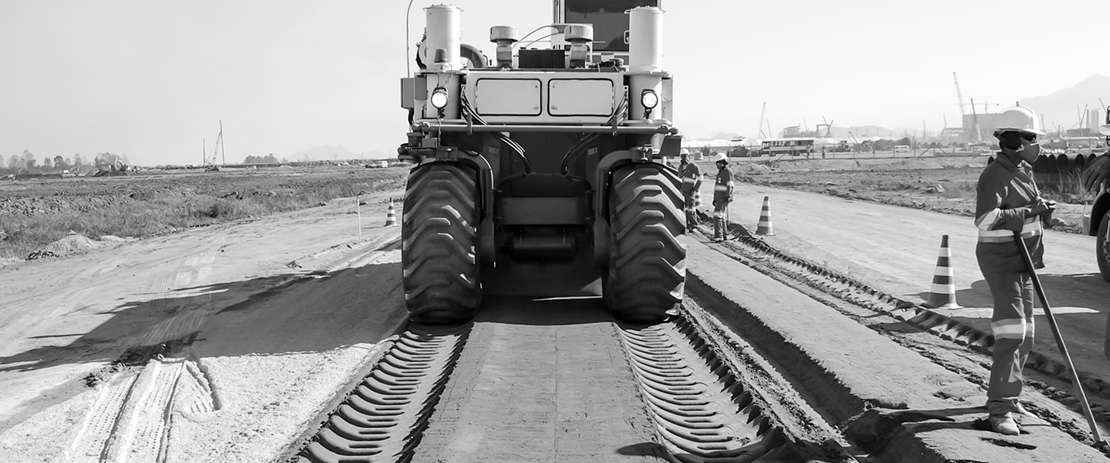EvoCrete® ST is a soil and cement modifier for the construction of base / bearing layers made via solidification of natural soil, recycled old base layers recycled into aggregates, crushed concrete waste and crushed recycled roads – including asphalt pavement.
Traditional

EvoCrete®

High Road
Traditional

EvoCrete®

Secondary Road
Traditional

EvoCrete®

Foundations
Traditional

EvoCrete®

Airplane runways

Soil

EvoCrete®

Construction Material

Asphalt carpet

Concrete

Sand
EvoCrete® ST is a soil and cement modifier for the construction of base / bearing layers made via solidification of natural soil, recycled old base layers recycled into aggregates, crushed concrete waste and crushed recycled roads – including asphalt pavement.
The application of EvoCrete® ST eliminates the need for all traditional base / bearing layer technologies for road and infrastructure projects, and removes necessity to excavate soil and construct a frost-thaw-resistant road base by the use of aggregates. The modification of the natural soil and the cement hydration process during the solidification procedure produces a base / bearing layer, with a significantly boosted bearing and load capacity. Additionally, frost-thaw-resistance and water impermeability are extremely intensified as a result of EvoCrete® monitored solidification. The following slide compares different examples of foundations and the thickness of the base / bearing layers.
Procedure steps
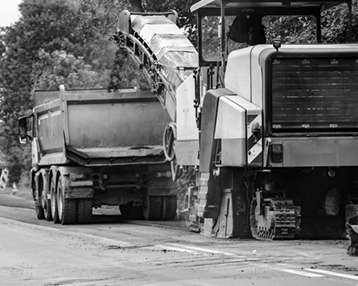
Step 1 - The old asphalt
Details
The old asphalt
- Milling of the old asphalt layers
- Up to 10 cm of the old asphalt material can be mixed together with the cement-EvoCrete-mixture
- Cracking of the old layer material
- Big stones were brought to the surface
- Milling of the mixed layer material with the stone crusher to a grain size less than 50 mm
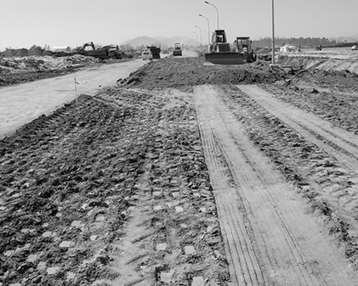
Step 2 - Surface preparations
Details
Preparation of surfaces
- Secure trafficability for construction equipment
- Reduce water content of soil, if required
- Exchange soil, if required
- Pre-leveling/pre-compaction of rough grade level
- Obstruction-free trafficability of the area
- Marking/pegging of stabilization area
- Safeguarding of subterranean service pipes
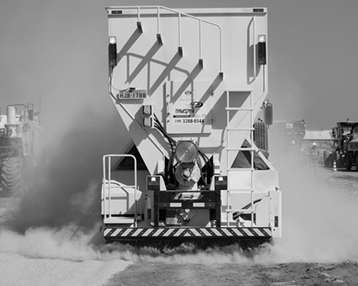
Step 3 - Cement spreading
Details
Spreading of cement
- Qualification test for specification of cement/additive mixture
- Production of cement
- Preparation and use of suitable spreading vehicle
- Construction site logistics for onschedule delivery of spreading vehicle
- Supervision of spreading procedure

Step 4 - Cement mixing
Details
Mixing of cement
- Mixing of cement/additive mixture for required strength using soil stabilizer in the soil
- In the case of milling depths requiring less than 50 cm, the soil is dug away, stored intermediary, mixed with cement and reused
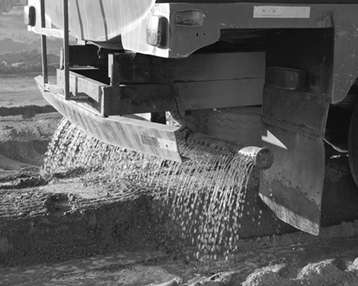
Step 5 - Surface watering
Details
Watering the surface
- Irrigating the base layer (evaporation protection) using an irrigation unit
- Continual adding of water without interrupting the milling work
- Filling procedure using vacuum tanker
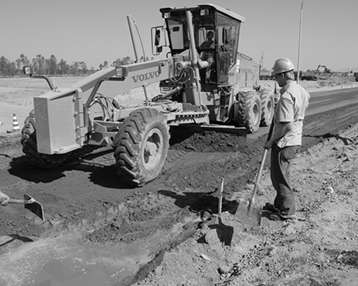
Step 6 - Surface Levelling
Details
Levelling of the surface
- On-site creation of precise grade level
- Post-profiling with grader (laser controlled) if necessary
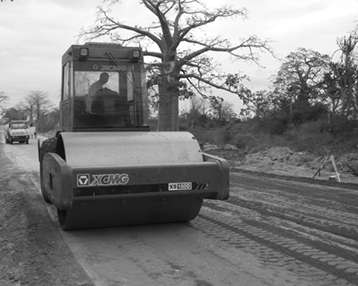
Step 7 - Surface compression
Details
Compression of the surface
- Dynamic and/or static compression on average 100% DPR using suitable equipment
- Compression of precise grade level using smooth drum roller on average 100% DPR using suitable equipment

Step 8 - Quality assurance
Details
Quality assurance
- Geotechnical support using static plate tests according to DIN 18134 and using dynamic plate tests as well as falling weight equipment
- Removal of drilling cores
- Compression strength tests, etc.
Product advantages
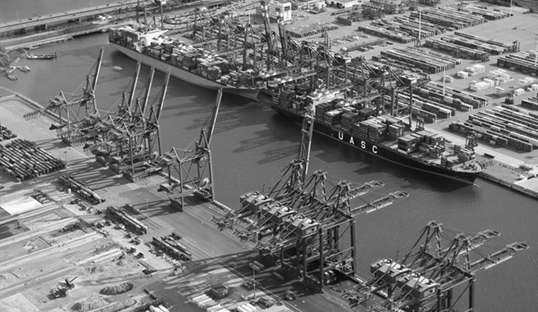
Financial Savings
- Reduction in costs for earth excavation, transport and landfill sites
- Reduction in purchases of materials for base layer and anti-frost layer
- Reduction of supplies of filling materials
- Reduction in paving, repairing and maintenance costs
- No anti-capillary layers needed
- Immobilization of hazardous materials without disposal and land fill charges

Time Savings
- Reduction of time expenditure for earth excavation
- Reduction in transportation needed to landfill sites
- Reduction in deliveries of materials for base layer and anti-frost layer
- Reduction in need of filling material supplies
- Possibility to avoid depth foundations (after prior static inspection and if foundation conditions are favorable)
- Reduction in settlement periods required
- Stabilization and immobilization possible in one procedure
Product properties

Processing and Results
- High load and bearing capacity
- Very resistant and durable
- Reduced formation of cracks
- Reduction of settlements
- Impermeable, leak-proof surfaces
- Acid-resistant, salt resistant
- Processing possible up to -6° C and under water
- Can be used for virtually any soil
- Immobilization of hazardous substances
- Favorable alternative to concrete technology

Environmental Savings and Sustainability
- Purely mineral components
- Completely recyclable
- Use of materials available on-site
- Lower strain on the environment as a result of considerably reduced transport
- Natural surfaces – no periods required for settlement
- As a result of building time reduction, reduction of building traffic and impact on general traffic (diversions, queues, etc.)
- Groundwater protection
- Reduction of CO2 emissions
News
Soil solidification with EvoCrete® in Indonesia
The following video was shot in Pulau Merah,Indonesia. It is a 3.6 km CSR road that sees very heavy truck traffic. The contractor was PT Tindodi and the client was Bumi Suksesindo Copper and Gold. The project was under the expert supervision of EvoCrete's® Indonesian partner PT Geoservices.
The existing road had been severely damaged through the use of over-loaded single axle transports. It had only been one year old, when repairs necessitated a complete rebuild of the top of the sub grade and the base and wear courses. EvoCrete® was chosen due to the tremendous cost savings, the durability of the product, the ease of application, and significantly reduced construction time/traffic management which only served to enhance savings further.
The community and the customer were both extremely satisfied during every step of the process.
